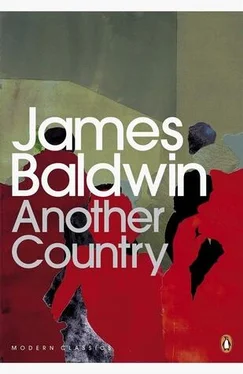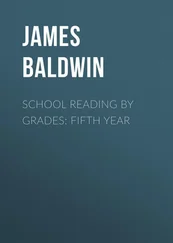Eric did not really listen to the music, he could not; it remained entirely outside him, like some minor agitation of the air. He watched Ida and Vivaldo, who sat opposite him, their profiles turned toward the music. Ida watched with a bright, sardonic knowingness, as though the men on the stand were beating out a message she had commanded them to convey; but Vivaldo’s head was slightly lowered and he looked up at the bandstand with a wry, uncertain bravado; as though there were an incipient war going on between himself and the musicians, having to do with rank and color and authority. He and Ida sat very still, very straight, not touching — it was as though, before this altar, touch was forbidden them.
The musicians sweated on the stand, like horses, played loudly and badly, with a kind of reckless contempt, and failed, during their first number, to agree on anything. This did not, of course, affect the applause, which was loud, enthusiastic, and prolonged. Only Vivaldo made no sound. The drummer, who, from time to time, had let his eyes travel from Ida to Vivaldo — then bowed his head to the drums again — registered Vivaldo’s silence with a broad, mocking grin, and gestured to Ida.
“It’s your turn now,” he said. “Come on up here and see what you can do to civilize these devils.” And, with the merest of glances at Eric and Vivaldo, “I think you might have had enough practice by now.”
Ida looked into his eyes with an unreadable smile, which yet held some hint of the vindictive. She crushed out her cigarette, adjusted her shawl, and rose, demurely. “I’m glad you think I’m ready,” she said. “Keep your fingers crossed for me, sugar,” she said to Vivaldo, and stepped up on the stand.
She was not announced; there was merely a brief huddle with the piano-player; and then she stepped up to the mike. The piano-player began the first few bars, but the crowd did not take the hint.
“Let’s try it again,” said Ida, in a loud, clear voice.
At this, heads turned to look at her; she looked calmly down on them. The only sign of her agitation was in her hands, which were tightly, restlessly clasped before her — she was wringing her hands, but she was not crying.
Somebody said, in a loud whisper, “Dig, man, that’s the Kid’s kid sister.”
There were beads of sweat on her forehead and on her nose, and one leg moved out, trembling, moved back. The piano-player began again, she grabbed the mike like a drowning woman, and abruptly closed her eyes:
You
Made me leave my happy home.
You took my love and now you’ve gone,
Since I fell for you.
She was not a singer yet. And if she were to be judged solely on the basis of her voice, low, rough-textured, of no very great range, she never would be. Yet, she had something which made Eric look up and caused the room to fall silent; and Vivaldo stared at Ida as though he had never seen her before. What she lacked in vocal power and, at the moment, in skill, she compensated for by a quality so mysteriously and implacably egocentric that no one has ever been able to name it. This quality involves a sense of the self so profound and so powerful that it does not so much leap barriers as reduce them to atoms — while still leaving them standing, mightily, where they were; and this awful sense is private, unknowable, not to be articulated, having, literally, to do with something else; it transforms and lays waste and gives life, and kills.
She finished her first number and the applause was stunned and sporadic. She looked over at Vivaldo with a small, childish shrug. And this gesture somehow revealed to Eric how desperately one could love her, how desperately Vivaldo was in love with her. The drummer went into a down-on-the-levee-type song, which turned out to be a song Eric had never heard before:
Betty told Dupree
She wanted a diamond ring.
And Dupree said, Betty,
I’ll get you most any old thing.
“My God,” muttered Vivaldo, “she’s been working.”
His tone unconsciously implied that he had not been, and held an unconscious resentment. And this threw Eric in on himself. Neither had he been working — for a long time; he had merely been keeping his hand in. It had been because of Yves; so he had told himself; but was this true? He looked at Vivaldo’s white, passionate face and wondered if Vivaldo were now thinking that he had not been working because of Ida: who had not, however, allowed him to distract her . There she was, up on the stand, and unless all the signs were false, and no matter how hard or long the road might be, she was on her way. She had started.
Give Mama my clothes,
Give Betty my diamond ring.
Tomorrow’s Friday,
The day I got to swing.
She and the musicians were beginning to enjoy each other and to egg each other on as they bounced through this ballad of cupidity, treachery, and death; and Ida had created in the room a new atmosphere and a new excitement. Even the heat seemed less intolerable. The musicians played for her as though she were an old friend come home and their pride in her restored their pride in themselves.
The number ended and Ida stepped off the stand, wet and triumphant, the applause crashing about her ears like foam. She came to the table, looking at Vivaldo with a smile and a small, questioning frown, and, standing, took a sip of her drink. They called her back. The drummer reached down and lifted her, bodily, onto the stand, and the applause continued. Eric became aware of a shift in Vivaldo’s attention. He looked at Vivaldo’s face, which was stormier than ever, and followed his eyes. Vivaldo was looking at a short square man with curly hair and a boyish face who was standing at the end of the bar, looking up at Ida. He grinned and waved and Ida nodded and Vivaldo looked up at the stand again: with narrowed eyes and pursed lips, with an air of grim speculation.
“Your girl friend’s got something,” Eric said.
Vivaldo glanced over at him. “It runs in the family,” he said. His tone was not friendly; it was as though he suspected Eric of taunting him; and so referred, obliquely, to Rufus, with the intention of humbling Eric. Yet, in a moment he relented. “She’s going to be terrific,” he said, “and, Lord, I’m going to have to buy me a baseball bat to keep all the hungry cats away.” He grinned and looked again at the short man at the bar.
Ida stepped up to the microphone. “This song is for my brother,” she said. She hesitated and looked over at Vivaldo. “He died just a little before Thanksgiving, last year.” There was a murmur in the room. Somebody said, “What did I tell you?”—triumphantly; there was a brief spatter of applause, presumably for the dead Rufus; and the drummer bowed his head and did an oddly irreverent riff on the rim of his drum: klook-a-klook, klook-klook, klook-klook!
Ida sang:
Precious Lord, take my hand,
Lead me on, let me stand.
Her eyes were closed and the dark head on the long dark neck was thrown back. Something appeared in her face which had not been there before, a kind of passionate, triumphant rage and agony. Now, her fine, sensual, free-moving body was utterly still, as though being held in readiness for a communion more total than flesh could bear; and a strange chill came into the room, along with a strange resentment. Ida did not know how great a performer she would have to become before she could dare expose her audience, as she now did, to her private fears and pain. After all, her brother had meant nothing to them, or had never meant to them what he had meant to her. They did not wish to witness her mourning, especially as they dimly suspected that this mourning contained an accusation of themselves — an accusation which their uneasiness justified. They endured her song, therefore, but they held themselves outside it; and yet, at the same time, the very arrogance and innocence of Ida’s offering compelled their admiration.
Читать дальше












